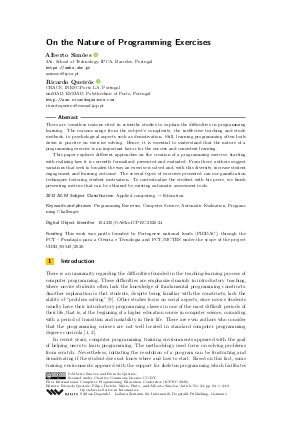On the Nature of Programming Exercises
Authors
Alberto Simões  ,
Ricardo Queirós
,
Ricardo Queirós 
-
Part of:
Volume:
First International Computer Programming Education Conference (ICPEC 2020)
Part of: Series: Open Access Series in Informatics (OASIcs)
Part of: Conference: International Computer Programming Education Conference (ICPEC) - License:
 Creative Commons Attribution 3.0 Unported license
Creative Commons Attribution 3.0 Unported license
- Publication Date: 2020-06-15
File

PDF
OASIcs.ICPEC.2020.24.pdf
- Filesize: 325 kB
- 9 pages
Document Identifiers
Subject Classification
ACM Subject Classification
- Applied computing → Education
Keywords
- Programming Exercises
- Computer Science
- Automatic Evaluation
- Programming Challenges
Metrics
- Access Statistics
-
Total Accesses (updated on a weekly basis)
0Document
0Metadata
Abstract
There are countless reasons cited in scientific studies to explain the difficulties in programming learning. The reasons range from the subject’s complexity, the ineffective teaching and study methods, to psychological aspects such as demotivation. Still, learning programming often boils down to practice on exercise solving. Hence, it is essential to understand that the nature of a programming exercise is an important factor for the success and consistent learning. This paper explores different approaches on the creation of a programming exercise, starting with realizing how it is currently formalized, presented and evaluated. From there, authors suggest variations that seek to broaden the way an exercise is solved and, with this diversity, increase student engagement and learning outcome. The several types of exercises presented can use gamification techniques fostering student motivation. To contextualize the student with his peers, we finish presenting metrics that can be obtained by existing automatic assessment tools.
Cite As Get BibTex
Alberto Simões and Ricardo Queirós. On the Nature of Programming Exercises. In First International Computer Programming Education Conference (ICPEC 2020). Open Access Series in Informatics (OASIcs), Volume 81, pp. 24:1-24:9, Schloss Dagstuhl – Leibniz-Zentrum für Informatik (2020)
https://doi.org/10.4230/OASIcs.ICPEC.2020.24
BibTex
@InProceedings{simoes_et_al:OASIcs.ICPEC.2020.24,
author = {Sim\~{o}es, Alberto and Queir\'{o}s, Ricardo},
title = {{On the Nature of Programming Exercises}},
booktitle = {First International Computer Programming Education Conference (ICPEC 2020)},
pages = {24:1--24:9},
series = {Open Access Series in Informatics (OASIcs)},
ISBN = {978-3-95977-153-5},
ISSN = {2190-6807},
year = {2020},
volume = {81},
editor = {Queir\'{o}s, Ricardo and Portela, Filipe and Pinto, M\'{a}rio and Sim\~{o}es, Alberto},
publisher = {Schloss Dagstuhl -- Leibniz-Zentrum f{\"u}r Informatik},
address = {Dagstuhl, Germany},
URL = {https://drops.dagstuhl.de/entities/document/10.4230/OASIcs.ICPEC.2020.24},
URN = {urn:nbn:de:0030-drops-123117},
doi = {10.4230/OASIcs.ICPEC.2020.24},
annote = {Keywords: Programming Exercises, Computer Science, Automatic Evaluation, Programming Challenges}
}
Author Details
Funding
This work was partly founded by Portuguese national funds (PIDDAC), through the FCT - Fundação para a Ciência e Tecnologia and FCT/MCTES under the scope of the project UIDB/05549/2020.
References
-
Anabela Gomes, Cristiana Areias, Joana Henriques, and António José Nunes Mendes. Aprendizagem de programaç~ao de computadores: dificuldades e ferramentas de suporte. Revista Portuguesa de Pedagogia, 42:161-179, 2008.

-
Tony Jenkins. On the difficulty of learning to program. In 3rd Annual LTSN-ICS Conference, pages 53-58, 2002.

- Kattis. Kattis, 2019. accessed on Jan 2020. URL: https://open.kattis.com/.
- José Paulo Leal and Fernando Silva. Mooshak: A web-based multi-site programming contest system. Softw. Pract. Exper., 33(6):567–581, May 2003. URL: https://doi.org/10.1002/spe.522.
-
Jon Orwant. Games Diversions & Perl Culture: Best of the Perl Journal. O'Reilly Media, 2004.

- Ricardo Queirós and José Paulo Leal. Babelo - an extensible converter of programming exercises formats. TLT, 6(1):38-45, 2013. URL: https://doi.org/10.1109/TLT.2012.21.
-
Ricado Queirós and Jose Paulo Leal. Making programming exercises interoperable with PExIL. In Jose Carlos Ramalho, Alberto Simões, and Ricardo Queirós, editors, Innovations in XML Applications and Metadata Management: Advancing Technologies, pages 38-56. IGI Global, 2013.

- Jakub Swacha, Ricardo Queirós, José Carlos Paiva, and José Paulo Leal. Defining requirements for a gamified programming exercises format. In Imre J. Rudas, János Csirik, Carlos Toro, János Botzheim, Robert J. Howlett, and Lakhmi C. Jain, editors, Knowledge-Based and Intelligent Information & Engineering Systems: Proceedings of the 23rd International Conference KES-2019, Budapest, Hungary, 4-6 September 2019, volume 159 of Procedia Computer Science, pages 2502-2511. Elsevier, 2019. URL: https://doi.org/10.1016/j.procs.2019.09.425.
-
Jacqueline L. Whalley, Raymond Lister, Errol Thompson, Tony Clear, Phil Robbins, P. K. Ajith Kumar, and Christine Prasad. An australasian study of reading and comprehension skills in novice programmers, using the bloom and solo taxonomies. In Proceedings of the 8th Australasian Conference on Computing Education - Volume 52, ACE ’06, page 243–252, AUS, 2006. Australian Computer Society, Inc.

